Hadith No. 1: The Power of Intention: Unlocking the Essence of Niyyah
al-Arbaʿīn al-Nawawiyyah, also known as the Forty Hadiths of Imam al-Nawawi, is a revered collection of forty-two traditions compiled by the renowned Islamic scholar Imam al-Nawawi. These hadiths encapsulate essential teachings of Islam, covering various aspects of faith, worship, ethics, and conduct. Each hadith offers profound insights and guidance, making Arbaeen al-Nawawiya a timeless source of spiritual wisdom for Muslims worldwide. It serves as a beacon of light, illuminating the path of righteousness and virtue for those seeking to deepen their understanding of Islam and enhance their practice of the faith.
Our new series explores each hadith of this widely accepted hadith collection.
عَنْ أَمِيرِ المُؤمِنينَ أَبي حَفْصٍ عُمَرَ بْنِ الخَطَّابِ قَالَ : سَمِعْتُ رَسُولَ اللهِ ﷺ يَقُولُ : " إِنَّمَا الأَعْمَالُ بِالنِّيَّاتِ ، وَإنَّمَا لِكُلِّ امْرِىءٍ مَا نَوَى ، فَمَنْ كَانَتْ هِجْرَتُهُ إِلى اللهِ وَرَسُوله فَهِجْرتُهُ إلى اللهِ وَرَسُوُله ، وَمَنْ كَانَتْ هِجْرَتُهُ لِدُنْيَا يُصِيْبُهَا ، أَو امْرأَةٍ يَنْكِحُهَا ، فَهِجْرَتُهُ إِلى مَا هَاجَرَ إلَيْهِ "
Translation: Narrated by the Commander of the Faithful (Amir al-Mu'minin), Abu Hafs 'Umar ibn al-Khattab, he said: "I heard the Messenger of Allah ﷺ saying: 'Verily, actions are but by intentions, and every man shall have only that which he intended. So whoever's migration was for Allah and His Messenger, his migration was for Allah and His Messenger, and whoever's migration was for some worldly gain or to marry a woman, his migration was for that for which he migrated.'"
About the Narrator:
'Umar ibn al-Khattab was born into the Banu Adi clan of the Quraysh tribe and was one of the senior companions of Prophet Muhammad ﷺ. Initially, he was a staunch opponent of Islam, but later converted and became one of the most prominent and influential companions of the Prophet. He played a crucial role in the early Muslim community and served as the second caliph after the death of Abu Bakr Al-Siddique.
He was the first to be called by the title Commander of the Faithful (Amir al-Mu'minin) among the caliphs. The Firsth Caliph Abu Bakr Al-Siddique was known as Khalifathu Rasoolillah, successor of the Messenger of Allah. In general, Amir al-Mu'minin has been used for Abdullah ibn Jahsh, may Allah be pleased with him, when the Prophet ﷺ, appointed him on a secret mission.
Abu Hafs 'Umar ibn al-Khattab bin Nufayl ibn 'Abd al-'Uzza al-Adawi al-Qurashi, his family tree meets with that of the Prophet ﷺ, in Ka'b ibn Lu'ay. The Prophet ﷺ named him Abu Hafs; linguistically, it means the lion. He was also titled by the Prophet as Al-Farooq, for his distinction between truth and falsehood in his Islam. The command of the Muslims before him was on the utmost secrecy, and after him, it was on the utmost visibility.
He converted after forty men and eleven women, in the sixth year of Prophethood, and he was pledged allegiance to for caliphate on the day of the death of Abu Bakr As-Siddiq, may Allah be pleased with them both, which was on a Tuesday, 18 Jumada al-Awwal, 13 AH, as a covenant from Al-Siddique. He made many significant conquests, as the Prophet ﷺ indicated in the famous Hadith of the Well.
Importance of this Hadith
The scholars unanimously agreed on its authenticity of this hadith and accepted it. Imam Bukhari started his famous Sahih collection with this hadith and gave it the status of preface. This indicates that every deed not intended for the sake of Allah is invalid, bearing no fruit in this world or the Hereafter.
Imam al-Baghawi started with this hadith in his book "Sharh al-Sunnah," Abdul Ghani al-Maqdisi in his book "Umdat al-Ahkam," and by al-Suyuti in his book "Al-Jami' al-Saghir." Many scholars have encouraged the beginning of books with this hadith as a reminder to the seekers of knowledge to correct their intentions at the outset of embarking on the path of seeking knowledge.
This hadith is one of the foundations upon which the religion revolves. It is reported that Imam Shafi'i said: "This hadith comprises one-third of knowledge and enters into seventy chapters of jurisprudence." Imam Ahmad, may Allah be pleased with him, said: "The principles of Islam are based on three hadiths: the hadith of Umar: 'Verily, actions are but by intentions,' the hadith of Aisha: 'Whoever innovates something in our matter [Islam] that is not of it, will have it rejected,' and the hadith of Nu'man ibn Bashir: 'The lawful is clear and the unlawful is clear.'" Many other scholars like Ishaq bin Rahawaihi, Al-Hakim, Abu Dawud has considered this hadith as one third or one fourth of the entire Islamic knowledge.
Key Terms:
A’amal – it is the plural form ‘Amal which means action. Here action means actions of a sane adult person.
Niyyaat – Plural of Niyyat, which means linguistically intention. It has different connotations which we will discuss in the explanation of this hadith.
Hijrah – means migration. In this context, it means migration from land of war against Islam to land of Islam where one can practice his Islamic belief and practices freely without a fear.
Explanation
The hadith emphasis that the actions of a person is accepted and rewarded as per the intentions behind it. So, when a person migration for the sake of Allah and his messenger, he is rewarded accordingly. But if his intentions behind the migration is worldly gains or a marrying a woman then he will what he intends for.
Here Scholars explains that there are two types of intentions.
First: Your Aim behind an action:
it denotes your real objective and purpose behind an action. Are you doing something for the sake of Allah or some other purpose. Or are your mixing your intentions between them. This what meant by sincerity or Ikhlas which has explained by scholars extensively in their writings. If we are not sincere in our actions to be for the sake of Allah, these actions will not be accepted. This niyyah or intention is connected with acceptance (Qabool) of any act of worship.
Quran used the word “Iradat” which means ‘want’ or ‘desire’ to mean this type of intention in many places. Here are few examples
“Among you are some who desire this world, and among you are some who desire the Hereafter.” (Quran 3:152)
"Whoever desires the harvest of the Hereafter - We increase for him in his harvest. And whoever desires the harvest of this world - We give him thereof, but there is not for him in the Hereafter any share." (Quran, 42:20)
But whoever desires the Hereafter and strives for it accordingly, and is a ˹true˺ believer, it is they whose striving will be appreciated. (Quran, 17:19)
"Whoever desires the life of this world and its adornments - We fully repay them for their deeds therein, and they therein will not be deprived." (Quran, 11:15) "Those are the ones for whom there is not in the Hereafter but the Fire. And lost is what they did therein, and worthless is what they used to do." (Quran, 11:16)
There many such verses where clearly says any acts that’s done for worldly gains and not sincere for the sake of Allah, will not rewarded in the hereafter. But rather, they will be given what they require by it in this world.
Many hadiths are reported with Niyyath in this meaning.
Imam Ahmad and Al-Nasa'i narrated from the hadith of Ubada bin Al-Samit, may Allah be pleased with him, from the Prophet ﷺ that he said: "Whoever fights in the cause of Allah and does not intend except the does not intend except a rope (used for tying a camel), then he will have what he intended." The worldly gains whatever small or big it may, it makes our actions fruitless in the hereafter.
Imam Ahmad also narrated from the hadith of Ibn Mas'ud, may Allah be pleased with him, from the Prophet ﷺ who said: "Indeed, most of the martyrs of my Ummah are those who die in their beds. And many of the slain between the two ranks, Allah knows best their intentions."
Ibn Majah narrated from the hadith of Jabir bin Abdullah, may Allah be pleased with him, from the Prophet ﷺ who said: "People will be gathered (in the day of judgement) according to their intentions."
Risks Associated with Niyyat and its effects on acts of worship
The most dangerous risk associated with Niyyath is Riyaa. Riyaa' or ostentation refers to performing acts of worship or good deeds with the intention of gaining praise, admiration, or approval from others, rather than seeking the pleasure of Allah alone. It involves doing things to be seen and recognized by people, rather than sincerely dedicating them to Allah. The connection between Niyyah and Riyaa' lies in the purity of one's intentions. When a person's intention is sincere, their actions are solely directed towards pleasing Allah, and they are not concerned about how others perceive them. However, when Riyaa' creeps into one's intentions, it corrupts the sincerity of their actions, as they are performed to seek validation or praise from people rather than seeking the pleasure of Allah. The result of such actions is punishment from Allah and eventually hellfire.
In a long hadith reported by Imam Muslim, narrated by Abu Huraira: I heard Allah's Messenger (ﷺ) saying, "The first of the people whose case will be decided on the Day of Judgment will be a man who died as a martyr. He shall be brought forth and Allah will make him recount His blessings (i.e., the blessings which He had bestowed upon him) and he will acknowledge them. Then Allah will ask him, 'What did you do (to seek these blessings)?' He will reply, 'I fought for You until I died as a martyr.' Allah will say, 'You have lied. You fought so that people might call you courageous, and they have done so.' Then orders will be passed against him and he shall be dragged with his face downward and cast into the Fire."
Another man will be brought forth who had acquired knowledge and imparted it (to others) and recited the Qur'an. He will be brought, Allah will remind him of His blessings and the man will acknowledge them. Then Allah will ask him, 'What did you do (to seek these blessings)?' He will reply, 'I acquired knowledge and disseminated it and recited the Qur'an seeking Your pleasure.' Allah will say, 'You have lied. You acquired knowledge so that people might call you learned, and you recited the Qur'an so that they might call you a reciter, and they have done so.' Then orders will be passed against him and he shall be dragged with his face downward and cast into the Fire.
Another man will be brought forth whom Allah had made abundantly rich and has granted every kind of wealth. Allah will remind him of His blessings and the man will acknowledge them. Then Allah will ask him, 'What did you do (to seek these blessings)?' He will reply, 'I did not neglect any of the ways You liked wealth to be spent liberally for Your sake.' Allah will say, 'You have lied. You did so that people might call you generous, and they have done so.' Then orders will be passed against him and he shall be dragged with his face downward and cast into the Fire”. (Muslim)
These are act of worships which are purely intended for praise and admiration from others. There is no doubt that such acts are not accepted by Allah and it is may be punishable.
Sometimes, a person may initiate an action for the sake of Allah and at the same time he may desire for recognition or praise from others. It a kind of association with Allah (shirk) and Allah will not accept such acts of worship.
Narrated by Abu Huraira, may Allah be pleased with him, from the Prophet ﷺ: "Allah, Blessed and Exalted, says: 'I am the Most Independent of partners. Whoever performs an action while associating others with Me in it, I leave it with its partner.'" (Sahih Muslim)
Narrated by Shaddad bin Aws from the Prophet ﷺ reported by Imam Ahmad: "Whoever performs Salah (prayer) to show off, then he has committed Shirk (associating partners with Allah). And whoever fasts to show off, then he has committed Shirk. And whoever gives charity to show off, then he has committed Shirk. Verily, Allah, Mighty and Majestic, says: 'I am the Best of those who partners are associated with. So whoever associates partners with Me in anything, I leave his deeds – its less and more - for his partner with whom he associated, and I am self-sufficient from him.'"
Sometimes, a person may initiate an action with the intention of pleasing Allah (sincerity), but then the desire for recognition or praise from others creeps in at some point while is performing it, if it is fleeting and short-lived and he repels it, then it does not harm him without dispute. But if it persists with him, does his action become invalidated, or does it not harm him and is he rewarded for his original intention? There is a difference of opinion among the scholars regarding this. Imam Ahmad and Ibn Jarir al-Tabari, maintain that if the original intention of an action was sincere, subsequent ostentation does not nullify the action. The individual will be rewarded based on their initial intention. This view is supported by Al-Hasan Al-Basri and others as well.
This view is supported by what Abu Dawood narrated in his Maraseel from Ataa' al-Khurasani: A man said, 'O Messenger of Allah! The Banu Salama, all of them fight. Among them are those who fight for worldly gain, and among them are those who fight for valor, and among them are those who fight seeking Allah's countenance. So, who among them is the martyr?' He said, 'All of them, if the basis of their matter is that the Word of Allah is supreme.'
Ibn Jarir mentioned: This difference is only in an action that is connected its starting to its end, such as prayer, fasting, and Hajj. As for what has no connection to it, such as recitation, remembrance, spending money, and spreading knowledge, it is cut off by the incidental intention of showing off and requires renewing the intention.
If an act of worship done for the sake of Allah while having some other objective also in mind other than ostentation, such as one going for Hajj along with the intention for doing business there, fasting along with intention of dieting and weight loss, will it be rewarded or not? Ibn Rajab Al-Hanbali and Imam Ibn Hajar Al-Haithami both says, in that case his reward from Allah will be reduced.
Al-Haithamin explains in his commentary on al-Arbaʿīn al-Nawawiyyah “This does not prevent the reward completely, as indicated by the text of al-Shafi'i and his companions: that whoever performs Hajj with the intention of trade... he will have a reward commensurate with his intention for Hajj. It is known that whoever intends with his jihad to elevate the word of Allah Almighty and to achieve some spoils... his reward is diminished, but not nullified; as reported by Muslim: “Indeed, the raiders, if they seize spoils, they hasten to distribute two-thirds of their reward, and if not their reward is complete'"
If someone has done acts of worship sincerely for Allah, and then Allah bestowed upon him good praise in the hearts of the believers because of that, he rejoices. In this sense, there is the hadith narrated by Abu Dharr from the Prophet ﷺ that he was asked about a man who does good deeds and people praise him for it? He said, 'That is the glad tidings of a believer.' (Muslim)
Similarly, the hadith narrated by At-Tirmidhi and Ibn Majah from Abu Huraira, may Allah be pleased with him, that a man said, 'O Messenger of Allah! A person performs deeds and hides them, but when they are noticed, he feels pleased?' He said, 'He will have two rewards: the reward for the secrecy and the reward for the disclosure.
Second Category of Niyyah:
As explained by jurists, second category of intention serves as the crucial factor in distinguishing between acts of worship and routine actions, as well as differentiating between various acts of worship themselves.
For instance, abstaining from food and drink might occur as part of a dieting regimen, due to physical incapacity to eat, or as an act of worship for the sake of Allah Almighty. Therefore, intention is necessary in fasting to differentiate it from mere dietary restrictions for other purposes. This aspect of intention is extensively discussed in the books of Fiqh or Islamic Jurisprudence.
Similarly, acts of worship like prayer and fasting encompass both obligatory and supererogatory forms. Obligatory acts vary, with the five daily prayers and Ramadan fasting being examples. The nature of obligatory fasting can range from Ramadan fasting to expiation fasts or vow fulfillments.
All these acts necessitate intention for their proper categorization and validation. There are differing opinions among scholars regarding when and where such intention is required, as well as the specific details to be included in it. This topic warrants thorough exploration, and followers of each school of Jurisprudence can refer to relevant scholars or texts for guidance.
Two key points deserve highlighting: Firstly, this type of intention is crucial for the validity (Sihhat) of an act of worship. Proper intention, as delineated in Fiqh literature, ensures the validity of the act, provided all other conditions are met. However, this intention alone does not guarantee acceptance and reward from Allah. While a valid act fulfills one's obligation and prevents punishment for neglect, its acceptance and reward hinge on the first category of intention, which reveals the true purpose and objective behind the act. Only when an act of worship is accepted by Allah is it truly rewarded, contingent upon one's genuine intention.
Secondly, the power of intention lies in its ability to transform habitual actions into rewardable acts of worship. For example, if one engages in physical exercise for health maintenance and intends to do so to preserve the blessing of health as a form of worship and service to Allah's command, that exercise becomes rewardable. Thus, through intention, any lawful and permissible action can be elevated to the status of worship, enabling believers to continuously earn reward in their daily lives.
Story Behind the Hadith
It is widely known that the story of the Migrant for Umm Qais (Muhajir Umm Qais) is the reason behind the saying of the Prophet Muhammad (peace be upon him): "Whoever migrates for the sake of worldly gain or to marry a woman, his migration will be for what he migrated for." Many later scholars have mentioned this in their works.
Waki' narrated in his book from Al-A'mash from Shu'ayb, also known as Abu Wa'il, who said: "A Bedouin from Al-Hayy proposed to marry a woman named Umm Qais, but she refused to marry him until he migrated. So, he migrated, and then she married him. We used to call him 'the Migrant for Umm Qais'." Abdullah ibn Mas'ud said: "Whoever migrates seeking something, he will get it."
But there are different opinions among the scholars whether this incident was the reason behind this hadith or it was it a totally different incident.
The story is mentioned by Al-Tabarani in Al-Kabeer with a chain of trustworthy narrators, as mentioned by Al-'Ayni, and with a sound chain according to the conditions of Al-Bukhari and Muslim, as stated by Ibn Hajar. However, Ibn Hajar Al-Asqalani says in Fat’hul Bari Sharah Sahih Al-Bukhari, that that the story is authentic but its attribution as the reason for the hadith is not supported by a valid chain of transmission. But Ibn Hajar Al-Haithami in his book Fat’hul Mubeen, implies this incident was the reason for the second part of the hadith.
May Allah indeed grant us sincerity in our intentions and accept all our righteous deeds, guiding us on the path of righteousness and granting us His mercy and blessings.
Disclaimer
The views expressed in this article are the author’s own and do not necessarily mirror Islamonweb’s editorial stance.

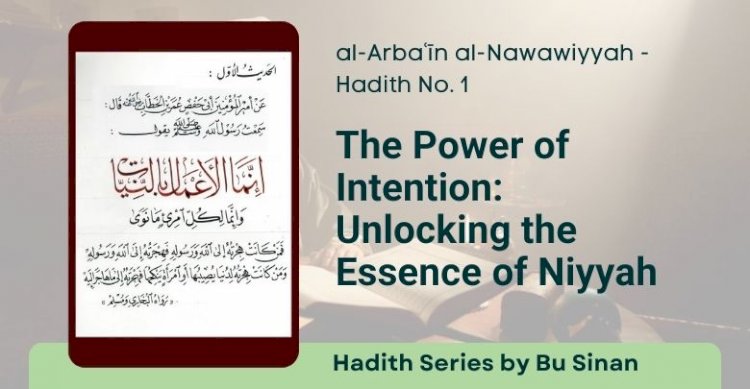



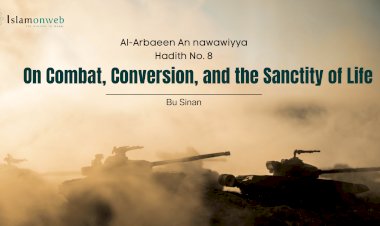

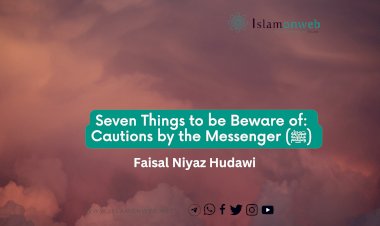
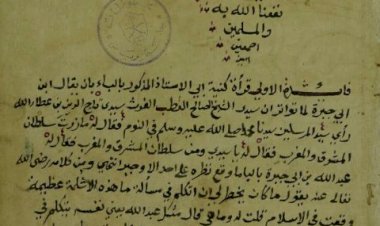
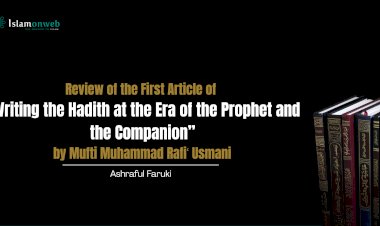
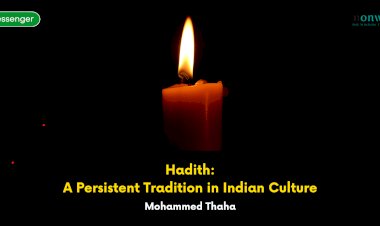














Leave A Comment